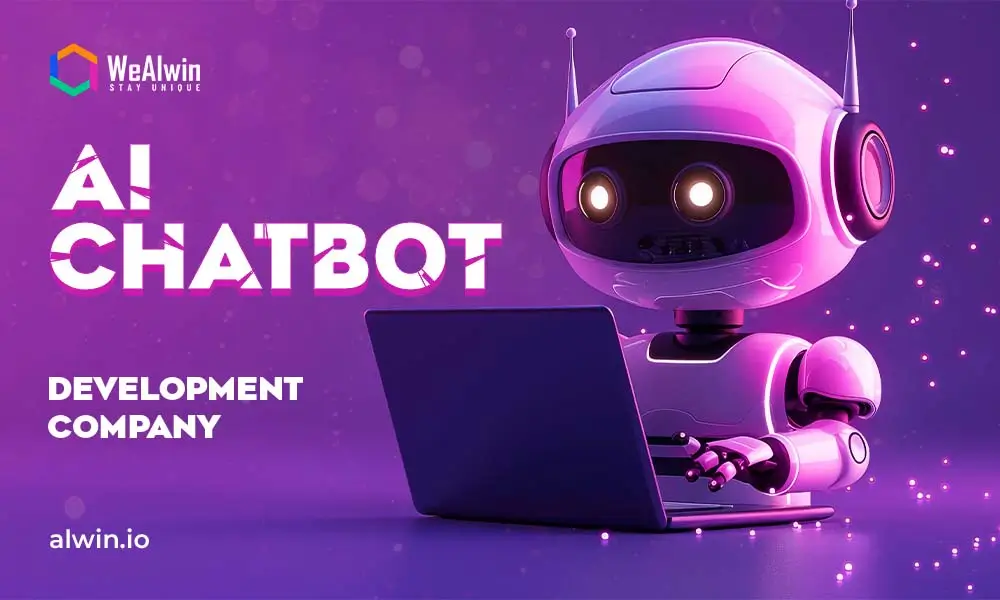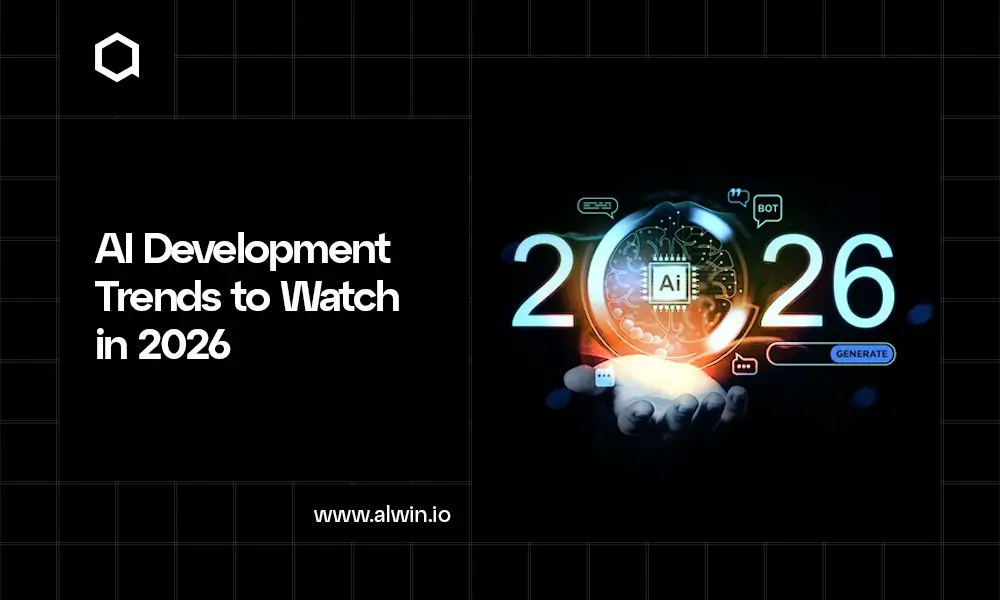In today’s digital world, various advanced technologies have emerged and play a dynamic role in diverse industries. AI chatbots are transforming this information era as a powerful tool by enhancing customer interaction and streamlining business operations. These intelligent systems can engage users in real-time, providing instant support, answering queries, and even facilitating transactions. As businesses become more aware of the benefits of conversational AI, partnering with a skilled AI development company has become crucial.
What is an AI Chatbot?
An AI chatbot is a software application that uses artificial intelligence to stimulate human-like conversations with users. These chatbots are capable of comprehending and racing to voice or text input. It enables them to engage in interactive dialogues across various platforms, such as websites, mobile apps, and social media. AI chatbots utilize technologies like Natural Language Processing (NLP) and Machine Learning (ML) to comprehend user intent and provide relevant responses.
Unlike traditional chatbots that use scripted responses, AI chatbots learn from interactions, continuously enhancing their accuracy. This enables them to handle a variety of inquiries, from simple FAQs to more complex tasks like booking appointments or processing orders. By automating communication and providing 24/7 support, AI chatbots enhance user engagement and operational efficiency. It makes them invaluable tools for businesses aiming to improve service delivery and foster customer satisfaction.
AI Chatbot Development
AI chatbot development has transformed the way businesses create virtual assistants that engage with users and provide accurate responses. The rapid advancements in digital technologies like Artificial Intelligence (AI), Machine Learning (ML), and Natural Language Processing (NLP) have impacted the growth of AI chatbots, helping businesses build a stronger online presence. Using advanced algorithms, neural networks, and machine learning techniques, modern chatbots can understand user input and adapt to context, providing personalized interactions.
AI Chatbot Development Company
Artifical Intelligent chatbot design, development, and deployment are the areas of expertise for an AI chatbot development company. Some businesses develop chatbots that can comprehend consumer inquiries and provide conversational responses by utilizing advanced technology like natural language processing (NLP), machine learning (ML), and artificial intelligence (AI). key services often include custom chatbot solutions modified to specific business needs. Key services frequently include user interface design that improves engagement, smooth interaction with current systems like CRM and e-commerce platforms, and custom chatbot solutions made to meet particular corporate needs.
AI Chatbots Development Services
GPT-based Chatbots
Our GPT-powered chatbots improve customer engagement, automate processes, and provide support across all departments of your organization with advanced natural language understanding and generation.
Customized AI Voice Assistants
We develop AI voice assistants that accurately understand and respond to user queries, offering instant and reliable assistance, transforming how your business interacts with customers and employees.
Custom CRM,ERP and CM Bots
Our intelligent bots integrate with your CRM, ERP, and CM systems, automating routine tasks, providing real-time data insights, and improving workflow efficiency to boost operational excellence.
Social Media Chatbots
We offer customized chatbot development services, creating conversational and messaging bots compatible with social media platforms like Facebook and Twitter for easy integration.
Transactional Chatbots
Designed to handle specific tasks such as processing orders, booking reservations, or managing payments, our transactional chatbots are ideal for e-commerce and customer service applications.
Retrieval-based Chatbot Solutions
We design retrieval-based chatbots that provide accurate, timely responses by selecting from predefined options, making them perfect for customer support, FAQs, and other quick-response applications.
Characteristics of AI Chatbots
AI chatbots possess several key characteristics that enable them to effectively simulate human-like interactions and enhance user experiences. Here are the primary characteristics of AI chatbots:
1. Natural Language Processing (NLP)
AI chatbots utilize NLP techniques to understand and interpret user inputs. This allows them to comprehend context, intent, and nuances in language, enabling more accurate and relevant responses to user queries.
2. Capabilities for Machine Learning
Over time, these chatbots learn from interactions by utilizing machine learning algorithms. With increased data processing, they gain a better grasp of consumer preferences and deliver more customized solutions.
3. Multilingual Support
AI chatbots with multilingual skills may converse with users in multiple languages. This feature broadens their accessibility and effectiveness in global markets.
4. Contextual Understanding
Smart AI chatbots are able to keep the context of a discussion intact. It enables them to provide logical responses that consider previous interactions. This characteristic helps create a more natural and engaging user experience.
5. Integration Capabilities
AI chatbots can seamlessly integrate with existing systems and platforms, such as CRM software, e-commerce platforms, and messaging apps. This integration allows for efficient data exchange and enhances the chatbot's functionality.
6. Data Analytics
AI chatbots collect valuable data from user interactions, which can be analyzed to gain insights into customer behavior and preferences. This data-driven approach helps businesses refine their strategies and improve service offerings.
7. Security Features
To protect user data, many AI chatbots incorporate robust security measures, including encryption and controlled access protocols. This is particularly important for applications involving sensitive information, such as financial transactions.
Benefits of AI Chatbot Development
AI chatbots offer numerous benefits that significantly enhance customer engagement, streamline operations, and improve overall business efficiency. Here are some key advantages of implementing AI chatbots:
Instant Responses: AI chatbots reduce waiting time and enhance the overall user experience with their quick responses to queries.
24/7 Availability: Customers can get responses anytime with the help of chatbots, and it is available anytime to provide seamless services.
Cost Efficiency: AI chatbots perform automated routine tasks and queries, allowing businesses to focus on more complex issues.
Data Collection and Insights: Data collection is one of the main processes of AI chatbots that allows them to gather valuable data on customer interactions, preferences, and behaviors. It can be used to improve products and services.
Personalization: AI chatbots utilize customer data to deliver customized experiences and recommendations that enhance user engagement.
Lead Generation and Sales Support: Assisting in qualifying leads, answering product questions, and even facilitating purchases are effectively done by AI chatbots to improve the sales process.
Reduced Human Error: Through analytical quality and automated responses, chatbots minimize the risk of human error in customer service interaction.
Multilingual Support: Most of the AI chatbots can communicate in multiple languages. This multilingual support allows businesses to serve a diverse customer base without needing additional support.
How Does an AI Chatbot Work?
AI chatbots operate through a combination of advanced technologies, including artificial intelligence (AI), natural language processing (NLP), and machine learning (ML). Here’s a breakdown of how AI chatbots work:
1. User Input
The process starts when a user types a message or speaks an order to the chatbot. This input can be in the form of questions, requests for information, or commands.
2. Natural Language Processing (NLP)
Once the chatbot receives the input, it uses NLP to analyze and understand the user's intent. NLP allows the chatbot to break down the text into understandable components, identifying keywords and phrases to interpret the meaning behind the user's message.
3. Intent Recognition
The chatbot employs algorithms to determine what the user is trying to achieve. This involves matching the input against predefined intents (goals) that have been programmed into the system. For instance, if a user requests assistance with placing an order, the recognized intent would be "place an order."
4. Context Management
Advanced AI chatbots can comprehend follow-up queries and allusions to earlier messages because they keep track of context during a discussion. By improving the sense of naturalness and coherence in interactions, this capacity improves the user experience.
5. Response Generation
After recognizing the user’s intent, the chatbot generates an appropriate response. Numerous methods exist for achieving this.
Predefined Responses: Chatbots may use scripted responses for common queries that are stored in their database.
Dynamic Responses: For more complex interactions, chatbots can generate responses spontaneously using AI models that consider various factors, including user data and previous interactions.
6. Machine Learning
AI chatbots continually learn from interactions with users. They improve their understanding of language nuances and user preferences over time by analyzing past conversations and outcomes. This adaptive learning enables them to provide more accurate and relevant responses in future interactions.
7. Backend Integration
Chatbots often integrate with backend systems such as databases, APIs, and CRM systems to provide accurate information and perform tasks (like booking appointments or checking order statuses). This integration allows them to access real-time data necessary for fulfilling user requests.
8. Testing and Optimization
Initially, chatbots undergo rigorous testing before deployment which ensures they function correctly across various scenarios. Post-launch requires continuous monitoring and optimization based on user feedback and performance metrics to enhance their effectiveness.
Types of AI Chatbots
AI chatbots can be categorized into several types based on their functionality and complexity. Here are the main types:
Rule-Based Chatbots: These chatbots follow predefined scripts and respond to specific commands or keywords. They mostly rely on human input to move the conversation along and have limited capacity to address sophisticated questions.
AI-Powered Chatbots: These chatbots use machine learning and natural language processing (NLP) to comprehend intent and context. They learn from interactions, allowing for more natural and dynamic conversations.
Voice Assistants: These chatbots operate through voice recognition and perform tasks based on verbal commands. Examples include Siri, Alexa, and Google Assistant, which use advanced AI to interpret and respond to spoken queries.
Transactional Chatbots: Designed for specific tasks, such as booking appointments, processing orders, or handling customer service inquiries, these chatbots guide users through processes and can integrate with payment systems.
Social Messaging Chatbots: Integrated into messaging programs such as WhatsApp and Facebook Messenger, these chatbots enable direct discussions and interactions within social media apps, giving businesses the opportunity to reach customers where they already connect.
Personalized Chatbots: By customizing conversations based on past behavior and preferences, improves user experience by offering individualized recommendations. They use user data to accomplish this.
Multi-Channel Chatbots: Capable of operating across various platforms, such as websites, mobile apps, and social media, these chatbots provide a consistent user experience regardless of the medium.
Steps Involved in the Chatbot Development Process
Developing a chatbot requires time and cost, they involve in several crucial stages to become effective one. Here are the key steps in the chatbot development process:
Define Objectives: Identify the purpose of the chatbot (e.g., customer support, lead generation, FAQs) and outline specific goals.
Research and Analysis: When you have an idea of the chatbot development, then analyze user needs and target audience. Understanding competitors may lead you to make some changes and help you deploy an effective chatbot in this advanced era.
Choose the Right Technology: When selecting a chatbot development platform and technologies, consider technical expertise, integration capabilities, scalability, and NLP support. Popular options include Dialogflow, Microsoft Bot Framework, IBM Watson, and AWS Lex.
Design Conversation Flow: Create a conversation map outlining potential user interactions, responses, and pathways, ensuring a natural flow.
Develop the Chatbot: Implement natural language processing (NLP) to interpret user inputs effectively. Utilizing APIs like Google Dialogflow, IBM Watson, and Microsoft LUIS to enhance capabilities. Train NLP models with relevant data to improve accuracy over time.
Test and refine: Test and refine the chatbot by conducting functional testing to ensure it performs intended tasks. Gather user feedback during beta testing to make improvements, and optimize responses based on performance metrics and user interactions.
Deploy and Monitor: Deploy the chatbot by integrating it into target channels such as websites, messaging apps, or mobile apps. Continuously monitor user interactions, gather feedback, and analyze performance data to make iterative updates and enhancements that improve its effectiveness over time.
Prominent Use Cases for AI Chatbots
AI chatbots are versatile tools that can be utilized across multiple industries to boost customer engagement, streamline operations, and improve service delivery. Here are some prominent use cases for AI chatbots:
Customer Support
AI chatbots can handle common customer inquiries through instant responses to frequently asked questions (FAQs) and resolve issues without the need for human intervention. This capability ensures 24/7 support and reduces waiting time, improving customer satisfaction.
E-commerce Assistance
In the e-commerce sector, chatbots can assist customers in product searches, provide personalized recommendations, and guide users through the purchasing process. They can also handle order tracking and returns that enhance the overall shopping experience.
Healthcare Services
AI chatbots perform a wide range of services in the healthcare landscape. It can schedule appointments, provide medication reminders, and offer basic health information. By asking initial queries to ascertain the urgency of the required care, they can also assist in patient triage.
Banking and Finance
In banking, chatbots can assist users with account inquiries, transaction history, and balance checks. They can also help with loan applications and provide financial advice based on user inputs, making banking more accessible.
Travel and Hospitality
In this fast-moving world, most the people use Internet for their travel from booking to accommodations. Travel chatbots play an essential role in this field by providing real-time updates on travel plans. It answers questions about destinations and offers personalized travel recommendations.
Education
In the educational landscape, chatbots can support students by answering questions about course materials, deadlines, and enrollment processes. They can also facilitate learning through quizzes and interactive content.
Why Choose WeAlwin Technologies for AI Chatbot Development?
By selecting WeAlwin as your trusted AI Development Company for AI Chatbot Development Solutions, you are aligning with an industry leader in innovative technology. Our skilled team utilizes expertise in artificial intelligence, natural language processing, and machine learning to develop chatbots customized to your business needs. We prioritize delivering personalized user experiences and provide 24/7 support to engage customers at any time. Choosing us means collaborating with a dedicated team focused on your success, offering specialized AI chatbot solutions that enhance client satisfaction and streamline processes across various sectors.
In today’s digital world, various advanced technologies have emerged and play a dynamic role in diverse industries. AI chatbots are transforming this information era as a powerful tool by enhancing customer interaction and streamlining business operations. These Artificial intelligent systems can engage users in real time, providing instant support, answering queries, and even facilitating transactions. As businesses become more aware of the benefits of conversational AI, partnering with a skilled AI development company has become crucial.



